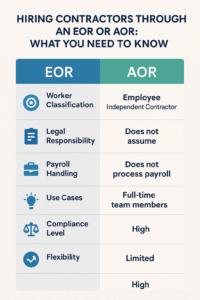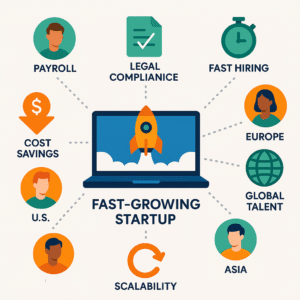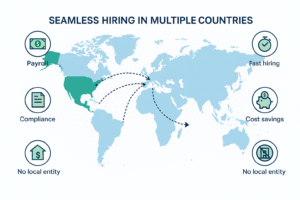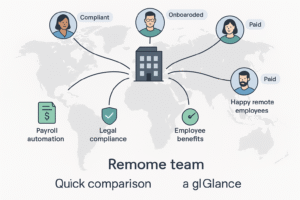Hiring the right people has never been easy, but lately Cambridge employers are finding it especially challenging. A glut of “help wanted” signs across Cambridge signals an almost unprecedented labour shortage in the city. In fact, the majority of companies across Canada – roughly 77% – report significant challenges in finding qualified workers. This talent shortage spans industries and job levels, leaving many local businesses short-staffed or unable to grow as planned.
Why is hiring so difficult now? A perfect storm of factors is straining the talent market. Demand for workers has rebounded, yet many candidates are scarce or have shifted careers. Some people who left industries like hospitality during the pandemic decided “they are not coming back”, and others are chasing opportunities in larger cities or new fields. Even with Cambridge’s unemployment rate around 7–8%, employers struggle to fill roles due to skills mismatches and competition for top talent. It’s a frustrating dilemma: jobs are open, but the right candidates are hard to find.
The good news is that there are proven strategies to tackle these recruitment challenges. In this post, we’ll explore evidence-based solutions that Cambridge business owners and hiring managers can use to attract and hire the people they need. From offering more competitive packages to tapping new talent pools, these approaches have helped companies overcome hiring hurdles. Let’s dive into practical steps you can take – and how partnering with a local recruitment agency can amplify your success – to ensure your team doesn’t miss a beat even in a tight labor market.
The Talent Shortage Challenge in Cambridge
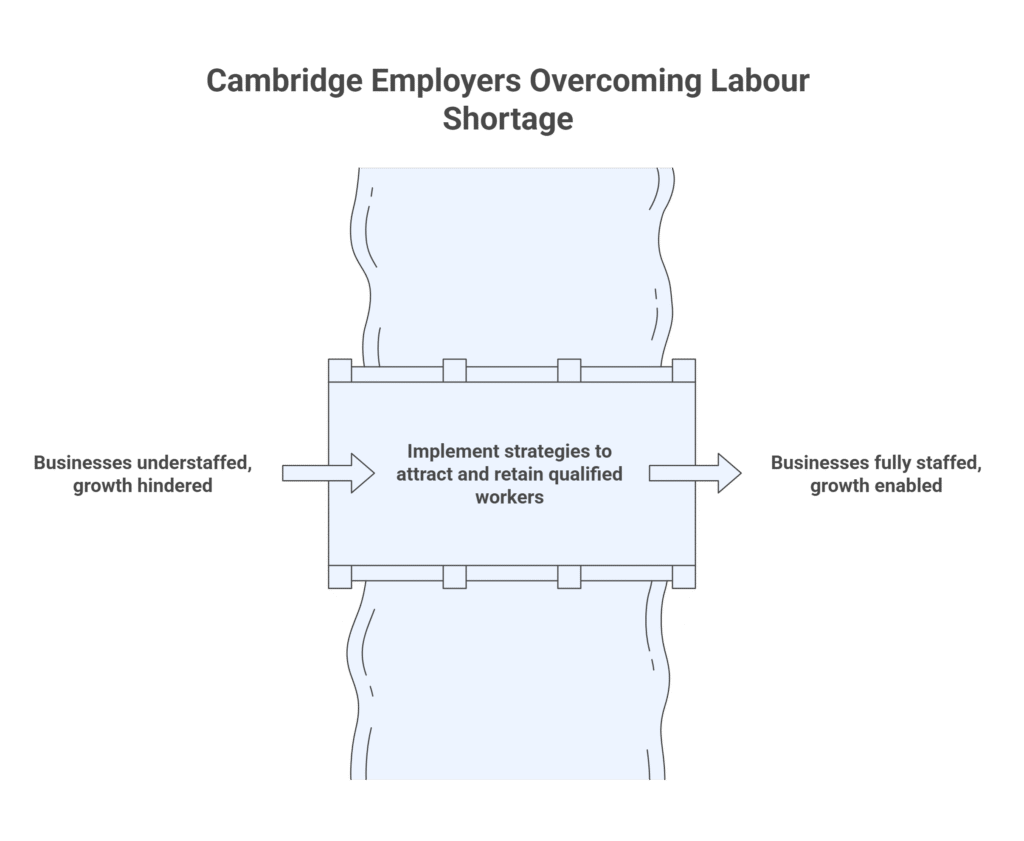
Cambridge, Ontario is a vibrant community with diverse industries – from advanced manufacturing and skilled trades to retail, logistics, and professional services. But today, employers in all these sectors share a common pain point: not enough applicants. Recent reports show the talent shortage is both local and national in scope. ManpowerGroup’s 2025 survey found 79% of Ontario employers are having difficulty finding the skills they need. Locally, businesses report unprecedented vacancy levels and longer times to hire than ever before.
Several factors contribute to this challenge:
- Skills Gap: The available workforce doesn’t always match the specialized skills employers need. Fast-changing technology and an aging skilled trades workforce mean there aren’t enough qualified candidates for roles like millwrights, CNC machinists, or IT specialists. A worldwide shortage of skilled workers is projected to reach 85 million by 2030, and Cambridge feels a slice of that problem today. Smaller companies especially struggle to compete for in-demand talent against larger firms.
- Post-Pandemic Shifts: COVID-19 disrupted the labor market. Many workers reevaluated their careers or left certain industries. For example, some hospitality and retail employees did not return to those jobs when businesses reopened. Others now prioritize different work conditions (like remote work or better work-life balance), making it harder for traditional roles to attract applicants.
- High Competition: When good candidates do come along, they get snapped up fast. Employers are essentially competing for talent. If your hiring process is slow or your job offer isn’t compelling, candidates will likely accept another opportunity. It now takes an average of 44 days to fill a role, yet top candidates are usually off the market in just 10 days. The window to engage and secure skilled people is very small.
Despite these headwinds, your business can find great employees. The key is to adapt your recruitment approach to today’s reality. Below we outline several strategies – backed by data and real-world experience – that can help Cambridge employers succeed in hiring even in a tight labor market.
Strategies to Overcome Your Recruitment Challenges
1. Offer Competitive Compensation and Benefits
One of the most direct ways to attract more applicants is to boost your compensation package. In a talent shortage, job seekers have options and will gravitate towards employers that offer the best pay and perks. According to a recent survey, 29% of companies are raising wages to address hiring difficulties. This isn’t surprising – pay remains the #1 factor in people’s decisions about where to work. In fact, over half of workers are worried about making ends meet, and one in five is considering switching jobs to get higher pay. If your salaries aren’t competitive for the Cambridge market, you’re likely losing candidates to other employers.
Review what similar roles are paying in Waterloo Region and be prepared to meet or slightly exceed those rates for strong candidates. Don’t forget about benefits either. Small businesses might not match big-corporation perks dollar for dollar, but think about what you can offer that employees value:
- Extended health or dental benefits, or even a modest spending account for wellness.
- Extra paid time off, flexible hours, or the option to work from home a couple days a week (more on flexibility shortly).
- Retirement savings matching or performance bonuses if possible.
- Non-monetary perks like a positive company culture, mentoring, and growth opportunities.
Sometimes, creative benefits can tip the scales. For example, if you can’t raise base salaries much, could you offer a sign-on bonus for high-demand roles or a retention bonus after 1 year? Even small gestures (like providing free coffee, meals during overtime, or gym membership discounts) can make employees feel valued. The goal is to present an overall package that makes people say, “That’s a place I’d like to work.”
Most importantly, make sure your current employees are paid fairly too – retention matters (losing staff means more positions to fill!). By ensuring your wages are competitive and your team feels appreciated, you not only attract new talent but also keep your best people from looking elsewhere.
2. Expand and Diversify Your Talent Pool
If the candidates you need aren’t coming to you, it’s time to expand where and whom you’re recruiting. Many Cambridge employers have traditionally fished in the same small talent pool – posting a generic job ad and expecting plenty of qualified locals to apply. In today’s market, that’s not enough. You may need to seek out new talent pools and be open to candidates who don’t fit the old mold exactly. In fact, about 24% of companies are actively targeting new or under-tapped talent sources to cope with shortages.
Here are some ways to broaden your candidate search:
- Widen the Geography: Consider casting a wider net across the Waterloo Region and beyond. With more roles offering remote or hybrid work, you might attract candidates from Toronto, Hamilton or other areas who could work remotely or relocate for a great opportunity in Cambridge. If the role is on-site, advertising in nearby cities (Kitchener, Guelph, Brantford) can pull in candidates willing to commute or move.
- Tap Into Schools and Training Programs: Develop relationships with local colleges, trade schools, and universities. Conestoga College, for example, produces skilled graduates in trades, IT, and business each year. Offering internships, co-op positions, or entry-level roles to recent grads can be a smart way to build your pipeline. Even if they lack experience, you can train them (see next strategy) and mold them to your needs.
- Consider Overlooked Groups: You might find great hires by considering candidates who are often overlooked. This could include career switchers from other industries, new immigrants who bring valuable skills, international students or recent graduates, or even retirees/older workers who want to stay active in the workforce. For instance, Ontario has been looking at international students as a way to fill skilled trades gaps – if your field has shortages, these non-traditional candidates could be a goldmine. An inclusive hiring approach not only helps solve labor shortages, it also contributes to diversity of thought in your company.
- Leverage Social Networks and Referrals: Don’t just post on one job board and call it a day. Share your job openings on LinkedIn, local Facebook groups, and industry forums. Encourage your employees to refer people they know (perhaps with a referral bonus incentive). Referrals often lead to some of the best hires. The idea is to go find the candidates rather than waiting passively – this might mean attending job fairs in Cambridge or engaging with online communities where your ideal hires spend time.
By opening up your criteria and where you search, you increase the odds of finding that perfect hire. For example, maybe the administrative assistant with stellar organizational skills comes from a different industry but can learn yours quickly. Or the machinist you need is actually a newcomer to Canada who just needs someone to give them a chance. Many employers are finding that with a bit of training, non-traditional candidates can become star employees – which brings us to our next point.
3. Invest in Training and Upskilling
When ready-made talent is hard to find, another solution is to create your own talent. Investing in training, upskilling, or reskilling programs can pay off significantly. In fact, 26% of employers are addressing skills shortages by upskilling their current workforce. For a small or mid-sized business, this strategy can be especially effective: you take motivated but perhaps less-experienced individuals and give them the skills to excel in your open roles.
Here are a few approaches:
- Hire for Attitude, Train for Skill: Identify candidates who have the right attitude, work ethic, and basic aptitude, even if they lack all the listed qualifications. For example, an entry-level IT support role might be hard to fill with an experienced person right now. But you could hire a tech-savvy college grad or a hobbyist programmer and then provide on-the-job training, certifications, or mentorship to get them up to speed. Often, a person with great soft skills and the willingness to learn will outperform a “fully qualified” hire who isn’t as adaptable.
- Upskill Your Existing Team: Look internally at your current employees. Are there team members who could advance into harder-to-fill positions with some additional training? Perhaps your reliable warehouse coordinator could become an inventory manager after a supply chain course, or a junior developer on your staff could grow into that vacant senior developer role with some mentorship. Promoting from within not only fills the higher role but then you’ll hire externally for the more entry-level spot, which is usually easier. Plus, it boosts morale – employees see a growth path in your company.
- Provide Ongoing Development: Create a culture of continuous learning. Offer to pay for employees’ relevant certifications, workshops or night courses. Host in-house training sessions or lunch-and-learns. Not only does this build skills, it also improves retention – team members feel you’re investing in their growth. (This is crucial, since an estimated 30% of new hires leave within their first 90 days, often due to lack of training or poor onboarding. Investing in development helps prevent that turnover.)
- Partner with Training Programs: Leverage resources like the local Workforce Planning Board or provincial programs that support training. There are often government grants or tax incentives for companies that apprentice new tradespeople or upskill workers. For example, the Canada-Ontario Job Grant can subsidize training costs for your employees. These programs can offset the cost of developing talent in-house.
Yes, training someone requires time and money – but consider the alternative: a position that stays vacant for months can cost your business much more in lost productivity. By growing talent from within or giving a less-experienced hire a chance with proper training, you build loyalty and fill your roles in a sustainable way. In a tight labor market, the employers who are willing to develop people often come out ahead in the long run.
4. Embrace Flexibility in Work Arrangements
Flexibility has become a highly sought-after benefit – and a powerful tool for attracting candidates who might not otherwise be available to you. Many people’s priorities shifted in recent years, and work-life balance considerations are top of mind. Offering flexible work options can dramatically widen your candidate pool and make your job offers more attractive. It’s telling that 20% of employers are offering more flexible schedules and 19% are offering more remote/work-from-home options to address hiring challenges.
Depending on your industry, consider implementing one or more of these flexible arrangements:
- Remote or Hybrid Work: If a job can be done remotely (even part-time), this could attract candidates from outside Cambridge or those who need to work from home. For instance, accounting, graphic design, software development, and many administrative tasks can be done remotely. A Cambridge business that allows a talented software developer to work from Toronto or only come in once a week may fill the role faster than one requiring full-time on-site. Even a hybrid model (e.g. 2 days remote, 3 days in office) can be a selling point.
- Flexible Hours: Not all jobs can be done off-site, especially in manufacturing or retail. But you can still provide flexibility in scheduling. Could you offer 4-day workweeks (four 10-hour days) for those who want an extra day off? Or flexible start/end times to accommodate parents’ childcare schedules or students’ classes? Even allowing shift swaps or some say in scheduling can make a difference. A working parent might choose your company over another because you let them start at 9:30 after school drop-off, for example.
- Part-Time or Job Sharing: If you’re struggling to fill a full-time role, consider whether it could be split into two part-time roles or structured as a job-share. There are skilled individuals (like semi-retirees or parents re-entering the workforce) who prefer part-time hours. Two part-timers might cover the hours you need and bring complementary skills. It’s a bit more coordination, but it can solve a hiring gap.
- Adapted Roles: In some cases, flexibility can mean tailoring a role to fit a candidate’s strengths. For instance, if you find a great candidate who can do 80% of a job’s duties but not a certain part, could you redistribute that task and still hire them? Being open-minded and creative with job design can help you land a quality hire who might otherwise have passed on the opportunity.
From an employee’s perspective, flexibility often rivals pay in importance. A recent study noted that many employees now expect remote or flexible options and will choose employers who offer them. Companies that embrace flexibility tend to see not only more interest from applicants, but also better retention and morale. It sends a message that you trust your team and care about their well-being. For roles where flexibility is feasible, making this a cornerstone of your recruitment pitch will set you apart in Cambridge’s job market.
5. Streamline and Speed Up Your Hiring Process
When you finally have candidates coming in, the last thing you want is to lose them due to a slow or cumbersome hiring process. Yet this happens frequently – in a competitive market, top talent gets snatched up quickly. As mentioned earlier, top candidates are often off the market within 10 days, so any delays on your end can mean missing out. That’s why it’s critical to streamline your hiring process for efficiency and a good candidate experience.
Consider the following tips to make your hiring process faster and more effective:
- Reduce Time Between Stages: Examine your current hiring steps. How many rounds of interviews or tests are truly necessary? While you want to be thorough, an overly long process will cause candidates to drop off or accept another job. Wherever possible, compress steps. For example, instead of five separate interviews on different days, maybe do one panel interview with multiple stakeholders. Or conduct initial interviews by phone/Zoom to speed up scheduling. Aim to move strong candidates from application to offer in a matter of weeks (or even days for urgent roles), not months.
- Improve Communication: Keep candidates in the loop at all times. Promptly acknowledge applications, and after interviews, communicate next steps and timelines. Candidates are more likely to stick with you if they know what’s happening and feel respected. Ghosting applicants or leaving them waiting for weeks reflects poorly on your company and drives talent away. Even a quick email update saying “You’re still in consideration, we expect to decide next week” helps keep them warm.
- Use Technology Wisely: Leverage recruiting tools to work more efficiently. An Applicant Tracking System (ATS) can help you filter resumes and track candidates. Scheduling tools can eliminate the back-and-forth of setting up interviews. Even using pre-set screening questions in your application form can save time by weeding out mismatches early. Automation shouldn’t replace the human touch, but it can handle repetitive tasks and free you up to focus on evaluating the best candidates.
- Be Ready to Make Competitive Offers: In this market, when you find a candidate you like, don’t hesitate too long – be ready to make a solid offer. That means getting internal approvals for hiring and salary ahead of time, so you’re not scrambling when the right person comes along. Also, consider what your “best offer” will be if you get into a bidding situation, so you can respond quickly if a candidate receives a counter-offer elsewhere. Sometimes a swift, strong offer can win a candidate over even if another company is still dragging them through interviews.
Speed and efficiency do not mean you should rush so much that you hire the wrong person. It means cutting red tape and unnecessary delay. Many recruiters report that their biggest challenge is simply attracting quality candidates – so when you have one, treat them like gold! Provide a positive, streamlined experience that reflects well on your company. Not only will you fill the job faster, but the candidate is more likely to accept your offer and even spread positive word-of-mouth about your company’s hiring process.
6. Partner with Local Recruitment Experts
Last but certainly not least, one of the smartest moves you can make is to partner with a recruitment agency – especially one that knows the Cambridge market. A professional staffing firm can dramatically reduce your hiring headaches by doing much of the legwork for you and leveraging their networks. Recruitment agencies maintain extensive databases of candidates and connections in various industries, which means they can often find qualified people much faster than a typical in-house hiring process. They spend every day sourcing, screening, and interviewing, so you can tap into that expertise.
Here’s how working with an agency can benefit your business:
- Faster Hiring: Agencies can cut down the time to fill your positions. They often have a shortlist of pre-vetted candidates for common roles. Instead of waiting weeks for applications, you might get a great candidate from the agency in days. Their vast talent network and proactive sourcing mean positions get filled quicker and with less effort on your part. You still make the final hiring decision, but they handle the heavy lifting up front.
- Access to Quality Candidates: Good recruitment firms don’t just send you a stack of random resumes. They thoroughly screen and interview candidates, so you receive only those who are a strong fit for your needs. Often, agencies have relationships with passive candidates (people not actively applying to jobs but open to the right opportunity) – these are folks you’d never reach via a job ad. By tapping into an agency’s talent pool, you get access to higher-quality prospects that you might miss on your own. This is especially valuable for hard-to-fill specialized roles.
- Market Knowledge and Advice: Staffing professionals who focus on the Cambridge and Southern Ontario region know the market salary rates, in-demand skills, and hiring trends. They can advise you on making competitive offers and even suggest tweaks to your job requirements to attract more candidates. For example, they might tell you that adding “or equivalent experience” to a degree requirement will yield more applicants, or that a certain certification is highly valued for the role you’re filling. Think of them as hiring consultants as much as recruiters. They’ll ensure you’re positioning your opportunity to appeal to the right people.
- Reduced Burden on Your Team: Handling a hiring process internally can be very time-consuming – reading resumes, scheduling interviews, checking references, etc., all while you still have a business to run. A recruitment agency takes on those tasks, presenting you with a shortlist of the best candidates. You and your team can focus on running operations, meeting clients, and other priorities while the agency handles initial applicant sourcing and screening. This can be a huge relief, turning a potentially months-long slog into a manageable decision-making process.
- Flexibility and Temp-to-Hire Options: Many staffing agencies can provide temporary or contract workers if you need interim help while searching for a permanent hire. They also allow temp-to-hire arrangements where you can trial a candidate on the job. This flexibility ensures your productivity doesn’t suffer due to vacancies. If you’re unsure about adding a permanent role, an agency can supply qualified temp staff (who they pay and employ) to support your business, with the option to hire them if they’re a great fit.
In short, partnering with a recruitment agency can save you time and improve hiring results. It’s like having an expert extension of your HR team. At the end of the day, your goal is to get the right people on board with minimal delay. An agency that’s deeply familiar with the local Cambridge talent market – from industrial workers to professionals – will already know where to find those people. They handle the grind of recruiting so you can focus on interviewing final candidates and running your company.
As a local Cambridge staffing agency, we’re here to help you implement all of the above strategies and find the talent you need. With our local market expertise and extensive candidate network, we’ve helped many Cambridge-area businesses overcome hiring challenges even in tough times. Leave your hiring to us, and we’ll take it from there.
(Call us today to discuss your staffing needs, or request a consultation – our team at [Your Staffing Company] is ready to support your success.) 🎉
FAQ: Hiring Challenges and Solutions for Cambridge Employers
Is there really a labor shortage in Cambridge right now?
Yes. Cambridge is experiencing a talent crunch that mirrors broader trends in Canada. Local news reports have highlighted an “almost unprecedented labour shortage” in the city. Many businesses have numerous job vacancies posted but not enough applicants. This isn’t just anecdotal – data confirms it’s widespread. A recent ManpowerGroup survey found 77% of Canadian employers (and about 79% in Ontario) are struggling to find qualified worker. In short, yes, there is a real labor shortage in Cambridge across multiple industries, making hiring more difficult than in years past.
What are the main causes of the current hiring challenges?
Several factors are contributing to today’s hiring challenges:
- Skills Shortages: There’s a mismatch between the skills employers need and the skills job seekers have. Fast-growing fields like IT, engineering, and skilled trades have more openings than qualified people to fill them. This skills gap leaves many positions open for long periods.
- Post-Pandemic Workforce Shifts: The COVID-19 pandemic led many workers to change their career paths or temporarily leave the workforce. For example, some who worked in hospitality or retail decided not to return to those industries. Others now seek remote work or better work-life balance, so they avoid jobs that don’t offer those.
- High Competition for Talent: With unemployment relatively low in many sectors, good candidates are in demand. Multiple companies compete to hire the same person. This means candidates can be picky and often receive multiple offers. If your offer or hiring process isn’t appealing, they move on to another opportunity. Recruiters note that attracting quality candidates is one of their toughest challenges now.
- Demographics: In some fields, a wave of retirements (aging workforce) is creating vacancies faster than new workers can fill them. Canada’s population is aging, and industries like manufacturing or skilled trades are feeling this acutely.
- Government Policies & Benefits: During the pandemic, financial support programs (like CERB) and expanded unemployment benefits gave some workers a cushion and reduced the urgency to take low-paying jobs. Some of those effects have lingered, with fewer people actively seeking certain types of work, especially if wages have not risen accordingly.
All these factors together create a tough environment for hiring. The important thing is to understand which factors affect your business the most (e.g., do you have a skills mismatch issue, or are competitors simply outbidding you for talent?) and then take targeted action, like adjusting pay or training new workers, to overcome those specific challenges.
How can small businesses compete with larger companies for talent?
Competing with big companies can be daunting for a small business, but there are effective strategies:
- Emphasize Your Advantages: Small firms can offer a family-like culture, more varied job roles, and a closer connection to the company’s mission. Many employees value being part of a tight-knit team where their work has a visible impact. Highlight opportunities for growth, learning, and the personal recognition they’ll get at a smaller company versus being “a number” in a big corporation.
- Offer Flexibility and Work-Life Balance: Large corporations can be bureaucratic about policies, whereas a small business can be nimble. Maybe you can allow a flexible schedule, remote work days, or extra time off in ways a big competitor cannot. Tailoring a role to an employee’s needs is often easier in a small business – use that to your advantage to attract people who need that flexibility.
- Be Competitive in Key Areas: You might not have a Fortune 500 budget, but try to match market salary for the role as much as you realistically can. If you can’t match benefits like fancy health plans, get creative: perhaps offer profit sharing, a better bonus, or other meaningful perks. Sometimes small things like free lunches on Fridays or staff social events can tip a candidate’s decision in your favor because it shows a fun, caring workplace.
- Use a Recruitment Agency: Small companies often lack dedicated HR teams or the time to source candidates extensively. Partnering with a recruitment agency can level the playing field. Agencies give you access to a large pool of candidates and do a lot of the screening work for you. This means you can find talent just as effectively as big firms that have full HR departments. Also, agencies often know what it takes for a smaller company to attract candidates and can advise you (for example, if a certain certification or slightly higher pay would make a difference). It’s noted that skills gaps hit smaller businesses harder, but working with a recruitment company can help bridge that gap.
- Highlight Growth and Learning: A big company might offer a defined ladder, but a small company can sometimes offer faster promotions or the chance to wear many hats. Make sure candidates know that by joining your team, they’ll be gaining a breadth of experience and could become a key player as the business grows.
In essence, focus on what makes your company special. People are often drawn to the authenticity and agility of local businesses. Combine that with as much compensation/benefits as you can manage and smart hiring assistance when needed, and you’ll have a compelling case that even big-company candidates will consider.
What are the advantages of using a recruitment agency instead of hiring on my own?
Using a recruitment agency can provide several key benefits:
- Faster Hiring Process: Agencies maintain large talent networks and often have candidates in mind for your role shortly after you engage them. They continuously recruit, so when you have an opening, they don’t start from scratch – they can quickly present you with qualified candidates. This speed is especially useful for urgent or hard-to-fill positions.
- Access to Better Candidates: A good agency will deliver a shortlist of vetted, quality candidates, not a flood of unfiltered resumes. They pre-screen for the skills and experience you need. Agencies also reach passive candidates who aren’t actively job-hunting but might be perfect for your role. These folks might never see your job ad, but they’re in the agency’s database or network. In short, an agency can widen and improve your candidate pool.
- Saves Your Time and Effort: Hiring can be a full-time job in itself – writing ads, sorting resumes, scheduling interviews, conducting phone screens, etc. When you outsource this to a recruiter, they handle those time-consuming steps. You and your team save time and can focus on your business. You’ll typically only interview the top finalists, which is a far smaller time investment. The agency also handles details like reference checks and initial communications.
- Market Insight and Guidance: Recruitment agencies know the hiring market inside-out. They can advise you on salary benchmarks, job description tweaks, and realistic hiring timelines. For example, if you’re not getting enough applicants, an agency might suggest that the required qualifications are too strict or that the salary is below market rate. This kind of expert advice can be invaluable, especially if you don’t hire frequently.
- Flexibility: Need a temporary worker or unsure if you want to hire permanent right away? Agencies offer temp and contract staffing solutions. You can bring in a temp through the agency (who handles payroll, etc.) and then decide to hire them full-time if it’s a good fit. This try-before-you-buy approach reduces hiring risk. It also helps if you have workload spikes or special projects – the agency can supply short-term staff without long-term commitments.
Overall, a recruitment agency becomes a partner in your hiring success. They bring efficiency, expertise, and reach that most individual businesses can’t match on their own. While there is a fee for their service, consider the cost of a prolonged vacancy or a bad hire – in many cases, the agency pays for itself by securing the right person more quickly and reliably.
How can I improve employee retention after I hire someone?
Retaining employees is absolutely critical, especially in a tight labor market – you don’t want to go through the hiring struggle only to lose people and have to do it again. Here are some retention strategies:
- Competitive Pay and Growth Opportunities: We’ve discussed offering good compensation to attract talent; it’s equally important for retention. Make sure you review salaries regularly and give raises when merited so employees don’t feel the need to leave for a pay bump elsewhere. Additionally, provide a path for growth. Employees are more likely to stay if they see future opportunities (promotions, skill development) within your company. Remember that nearly one-third of new hires leave within 90 days, often because the job wasn’t what they expected or they didn’t see a future. Setting clear expectations and showing a career path can prevent that early turnover.
- Onboarding and Training: A strong onboarding process helps new hires feel welcome and competent in their roles. Don’t just throw them into the deep end. Pair them with a buddy or mentor, check in regularly, and provide the training they need to succeed. Ongoing training and professional development (as discussed earlier) keeps employees engaged and loyal. When people feel you’re investing in their growth, they’re more likely to stay.
- Positive Work Culture: Workplace culture is a major factor in retention. Foster an environment of respect, inclusion, and recognition. Celebrate wins and give employees credit for their contributions. Address any toxic behaviors quickly. Encourage teamwork and open communication. When people genuinely enjoy coming to work and feel part of a community, they won’t be as tempted to look elsewhere.
- Work-Life Balance: Burnout is a big reason employees quit. Ensure your team isn’t consistently overworked or expected to sacrifice their personal life for the job. Offer reasonable flexibility as we discussed (for appointments, family needs, etc.). Encourage people to take their vacation time and actually disconnect. A company that respects work-life balance will keep employees longer – they won’t feel they have to leave to reclaim their personal time.
- Listen and Act on Feedback: Conduct stay interviews or periodic feedback sessions to learn what employees like and what issues concern them. An anonymous survey now and then can surface problems. The key is to act on what you learn – if employees consistently say they want more frequent check-ins or better tools to do their job, take steps to provide that. When staff see that management listens and improves things, trust and loyalty grow.
By implementing these retention practices, you’ll reduce turnover and build a stable team. In a market where hiring is hard, keeping the great people you already have is half the battle. Plus, a reputation as a great place to work will in turn help attract new candidates – it’s a virtuous cycle. Focus on being the kind of employer that you would want to work for, and you’ll retain more of your hires for the long run.
Additional Improvements (Beyond the Blog Content):
To further boost your online visibility and attract the local Cambridge audience, here are some technical and local SEO enhancements you should consider:
- Optimize Site Speed and Mobile Experience: Ensure your website loads quickly and is mobile-friendly. Page speed is a confirmed Google ranking factor, and a fast, responsive site will not only rank better but also keep visitors from bouncing. Use tools like Google PageSpeed Insights to identify and fix slow elements. Given that many job seekers will browse openings on their phones, a smooth mobile experience is crucial.
- Leverage Local SEO – Google Business Profile: Claim and fully optimize your Google Business Profile (formerly Google My Business) for your staffing agency. Include accurate NAP (Name, Address, Phone) info, business hours, a detailed description with keywords like “Cambridge recruitment agency,” and some photos. This boosts your visibility in local searches and Google Maps results. Nearly 46% of all Google searches have local intent, so this is low-hanging fruit. Also, businesses with complete Google Business profiles tend to rank higher in local results.
- Encourage Online Reviews: Happy clients and candidates should be encouraged to leave reviews on Google, Facebook, or industry-specific review sites. 82% of consumers read online reviews for local businesses, and a strong rating can set you apart from competitors. Respond professionally to reviews (both positive and negative) to show engagement. Reviews not only build trust with prospects but also contribute to local SEO ranking.
- Build Local Citations and Backlinks: Get your business listed in reputable local and industry directories. For example, ensure your agency is listed on ClearlyRated, Cambridge Chamber of Commerce directory, CambridgeToday’s business directory, and other relevant sites. Consistent citations of your Name-Address-Phone across the web improve your local search rankings. Additionally, aim to earn local backlinks – for instance, sponsoring a Cambridge community event or writing a guest article on a local news site could land you a link. Each quality backlink signals to Google that your site is authoritative, which can boost rankings.
- Use Local Keywords in Key Places: Beyond this blog post, review your website’s core pages (Home, About, Services) to make sure they incorporate local keywords naturally. Titles, meta descriptions, and headings should include “Cambridge” where appropriate. For example, a title tag like “Staffing and Recruitment Services in Cambridge, ON | [Your Company]” would target your location effectively. Including your location in page content and even in image ALT text (e.g., “Cambridge Ontario office”) can send stronger local signals to search engines.
- Implement Structured Data Markup: Add schema markup to your site for Local Business and for FAQ sections of your blog. For instance, marking up your business name, address, phone, and website with LocalBusiness schema helps search engines display rich info about your company (and can make you eligible for the local knowledge panel). Similarly, using FAQPage schema for the Q&A in this blog can enhance the chance of getting rich snippet results on Google, which improves click-through rate.
- Continue Publishing Quality Content: A one-time blog is helpful, but an ongoing content strategy will yield compounding SEO benefits. Consider writing more blog posts addressing specific Cambridge hiring trends, success stories, or tips for both employers and job seekers. Content that resonates with local readers and includes local terms can attract backlinks and shares. Over time, establishing your site as a go-to resource for recruitment insights can boost your domain authority. Just be sure each post is well-structured (like this one) with proper headings and offers genuine value, as Google rewards high-quality, informative content.
- Social Media and Community Engagement: While not a direct ranking factor, active social media profiles can amplify your content’s reach and drive traffic (which can indirectly improve SEO through increased engagement). Share your blog posts on LinkedIn, Facebook, Twitter, and any Cambridge community groups or pages. Engaging with the community – e.g., posting local job fair announcements, commenting on local LinkedIn discussions – increases your brand’s visibility. Over time, these efforts can lead to more brand searches and direct traffic, which are positive signals in the eyes of search engines.
Divino Business Solutions can help you with these and we are just one call away. Check out how to simplify recruitment or The Bias of Interviews: Are You Just Hiring a Smile?
Sources:
- CambridgeToday News – “Cambridge employers struggle to attract workers as COVID uncertainty looms”cambridgetoday.ca.
- Canadian HR Reporter – “Hiring challenges persist as Canadian employers struggle to find talent: Report”hrreporter.comhrreporter.comhrreporter.com.
- Cambridge Chamber of Commerce – “SMEs continued to be plagued by staffing shortages” (local business anecdotes)cambridgechamber.comcambridgechamber.com.
- Joingenius (Recruitment Statistics 2025): Average time to hire and candidate availabilityjoingenius.com.
- Randstad (USA) – Advantages of partnering with a recruitment agencyrandstadusa.comrandstadusa.comrandstadusa.comrandstadusa.com.
- Recruitment Industry Stats – Glassdoor/Entelo data via Joingeniusjoingenius.comjoingenius.com.
- SearchEngineJournal – “Page Speed as a Google Ranking Factor” (SEO best practice)searchenginejournal.com.
- SearchEndurance – “Google Business Profile Statistics (2025)”searchendurance.com.
- Publer – “Essential Google My Business Statistics”publer.com.
- The Hoth – “Ultimate Local SEO Guide: Local SEO Ranking Factors”thehoth.com.


